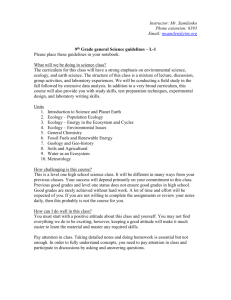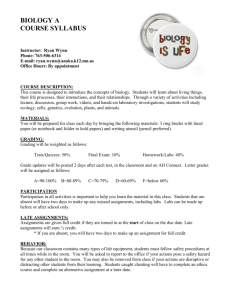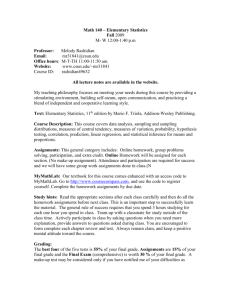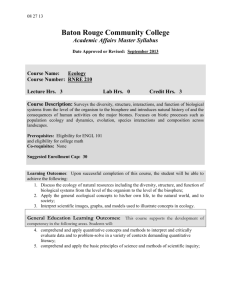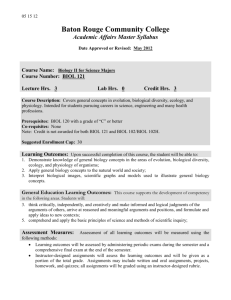Wlf 314: WILDLIFE ECOLOGY I (3cr)
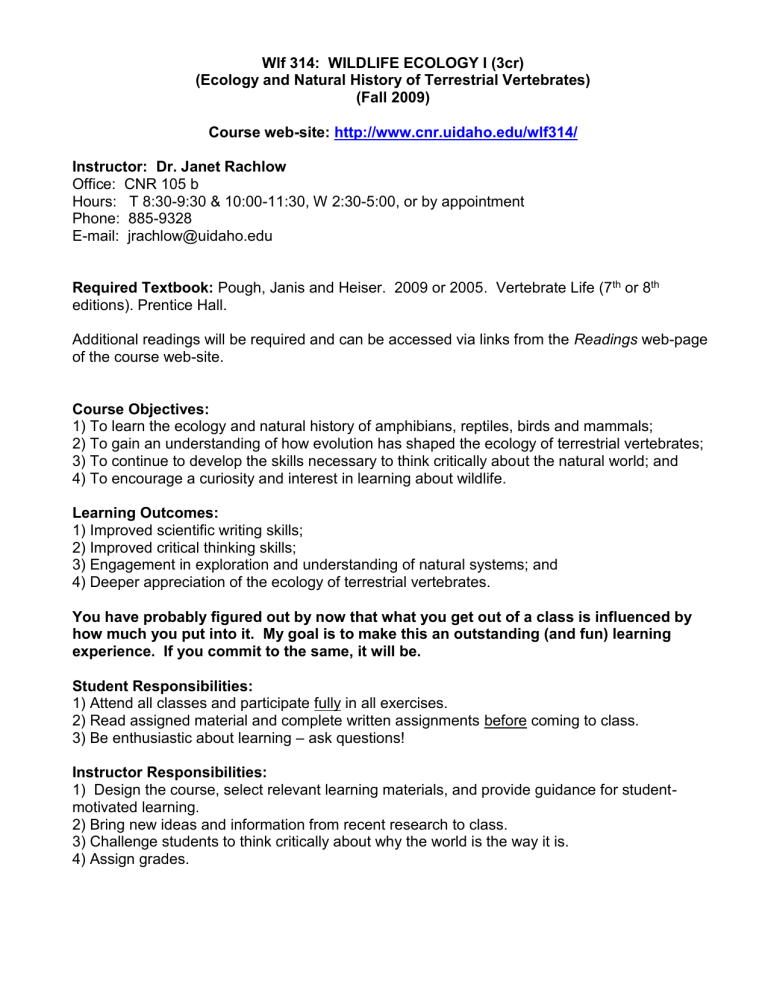
Wlf 314: WILDLIFE ECOLOGY I (3cr)
(Ecology and Natural History of Terrestrial Vertebrates)
(Fall 2009)
Course web-site: http://www.cnr.uidaho.edu/wlf314/
Instructor: Dr. Janet Rachlow
Office: CNR 105 b
Hours: T 8:30-9:30 & 10:00-11:30, W 2:30-5:00, or by appointment
Phone: 885-9328
E-mail: jrachlow@uidaho.edu
Required Textbook: Pough, Janis and Heiser. 2009 or 2005. Vertebrate Life (7 th or 8 th editions). Prentice Hall.
Additional readings will be required and can be accessed via links from the Readings web-page of the course web-site.
Course Objectives:
1) To learn the ecology and natural history of amphibians, reptiles, birds and mammals;
2) To gain an understanding of how evolution has shaped the ecology of terrestrial vertebrates;
3) To continue to develop the skills necessary to think critically about the natural world; and
4) To encourage a curiosity and interest in learning about wildlife.
Learning Outcomes:
1) Improved scientific writing skills;
2) Improved critical thinking skills;
3) Engagement in exploration and understanding of natural systems; and
4) Deeper appreciation of the ecology of terrestrial vertebrates.
You have probably figured out by now that what you get out of a class is influenced by how much you put into it. My goal is to make this an outstanding (and fun) learning experience. If you commit to the same, it will be.
Student Responsibilities:
1) Attend all classes and participate fully in all exercises.
2) Read assigned material and complete written assignments before coming to class.
3) Be enthusiastic about learning – ask questions!
Instructor Responsibilities:
1) Design the course, select relevant learning materials, and provide guidance for studentmotivated learning.
2) Bring new ideas and information from recent research to class.
3) Challenge students to think critically about why the world is the way it is.
4) Assign grades.
COURSE OUTLINE
Reading Assignments are posted on the course web-site and will be announced in class.
Please check the web-site regularly for up-dates. ( http://www.cnr.uidaho.edu/wlf314/ )
Week Weekly Topics
Aug 24-28 Vertebrates Diversity, Evolution & Systematics
Aug 31-Sep 4 Natural Selection & Evolution; Endothermy & Ectothermy
Sep 9-11 Amphibians & Reptiles : Ecology & Diversity
Sep 14-18
Oct 12-16
Amphibian & Reptile Population trends; Birds : Flight (TEST 1)
Sep 21-25
Oct 5-9
Avian Ecology & Diversity
Sep 28-Oct 2
Mammals : Reproduction & Ecology
Mammalian Diversity; Home Range & Territoriality
Habitat Ecology (TEST 2)
Oct 19-23
Mating Systems & Sociality; Foraging Ecology
Oct 26-30
Nov 2-6
Nov 9-13
Nov 16-20
Nov 23-27
Historic Perspective of Wildlife in North America; Natural History of Ungulates
Case study: Ungulates in the Yellowstone Ecosystem; Natural History Waterfowl &
Upland Game Birds
(TEST 3) Natural History of Chiroptera & Lagomorphs
Case study: Snowshoe Hares in the Kluane Ecosystem; Natural History of the
Mustelidae & Felidae
Fall Break – No Class
Nov 30 -Dec 4 Natural History of Canids; Case study: Wolves in the Isle Royale Ecosystem
Dec 7-11 Natural History of Ursids; Review for final exam
Dec 14
TEST 4 & Final Exam – Monday at 7:30-9:30 am
Test Schedule:
Test 1: Sep. 16
Test 2: Oct. 16
Test 3: Nov. 9
Test 4: Dec. 14
Grading Policy:
Grades will be assigned on the basis of percentage of total points earned. Tests and assignments will NOT be graded on a curve.
>90% = A
80% to 89% = B
70% to 79% = C
60% to 69% = D
< 60 % = F
Assignments and Points:
Tests (4 x 100 pts each)
Written Assignments
Pop quizzes (5 pts each)
Class Participation
Final Exam
Points
400
350
30
20
100
Total Points: 800 / 900
Each test will include information covered since the previous test. Pop quizzes worth 5 pts each will be given throughout the semester and will cover material from the assigned readings and/or the previous lecture. The Final Exam will be comprehensive, however, students who have a
"solid A" (> 91%) going into the final will not be required to take the final exam, and their grades will be determined based on a total of 800 pts rather than 900 pts.
Make-up tests/exams: Make-up tests will be available only if the instructor is contacted before the test date and only under extenuating circumstances. The final exam must be taken at the assigned time (Dec. 14th at 7:30 am).
Late Assignments: Written assignments are due at the start of class on the due dates.
Assignments will lose half a letter grade if turned in later that day, and one letter grade for each day past the due date.
Classroom Policies:
1) Be on time, read the assigned readings before class, and participate in discussions and activities.
2) Help create a respectful, fun, and open class environment where everyone is comfortable expressing ideas. Derogatory comments or behavior based on race, gender, sexual orientation, or physical or mental abilities is not appropriate for class.
3) Academic honesty and integrity are University Policies. Failure to maintain these standards could result in a failing grade and/or referral to the Dean of Students. See Departmental
Policy on Plagiarism (link from Wlf 314 home page). Although studying together for tests and other assignments can be helpful, your assignments should be written individually.
Please do not put us in the difficult position (for us and you) of having to enforce these policies.
Attendance: Students are expected to attend all class meetings. Students are responsible for work missed during an absence. In-class activities (pop quizzes, etc.) missed due to an unexcused absence will receive a zero. Participation points will be determined at the end of the semester based on participation in class (attendance, asking/answering questions, entering into discussions, etc.).

